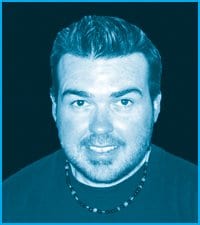Michael Barrett, director of programming for Out On Screen, uses the language of a creator and a visionary. “Art is the most powerful communication tool for change that we have on this planet,” he says.
The annual August event, western Canada’s largest queer film festival, may be months away but there is a lot of activity in the group’s heritage office overlooking Victory Square. Barrett chooses the words “blank canvas” to describe the off-season challenge; each year more than 500 films are submitted to be viewed and selected by Barrett and a volunteer programming team. Their yearly goal: “All should have access to alternate queer images not represented by mainstream media.” According to Barrett, Out On Screen will ideally reflect and include representations of everyone from the queer community.
Programmers of queer festivals face challenges, including increased competition with quick DVD releases and broadcast television, as well as astronomical distribution costs. Another ongoing challenge is festival funding-having the resources to maintain and develop programs.
Out On Screen has evolved and refined the term ‘festival.’ Rather than just offering collection of films to be viewed passively by an audience, the festival aims to be a gathering space where people can interact, as well as discuss issues with informed panels. As part of this purpose, Out On Screen has developed a community programming section where local individuals and groups are given the opportunity to curate a screening.
“Community-based” is integral to Out On Screen’s vision, explains executive director Drew Dennis: “People ask me all the time, what does that mean? It means that it is a festival by and for the community. Our community programming series is just one way that anyone in the community can get involved and participate. Rather than the festival be programmed by just one individual, or a small group of folk, we’re interested in bringing in a whole range of perspectives.”
Past topics developed through the community programming series include queer youth and HIV, queer jocks and their images from the Amsterdam gay games, and theme based programs on spirituality. Last year’s festival featured a Bear program curated by local media artist Clark Nikolai, and another by the Menopausal Old Bitches. A multi-media self-expression by Duane Ghastant’ Aucoin, Children of the Rainbow (Kichx Anagaat Yatx’i), won the $1500 audience favourite award.
No experience is necessary to participate in the community programming series. Those accepted for the 2004 festival will take a programming workshop with Barrett, view and choose films, and write guide copy.
One of the best ways of defining our diverse queer community is by telling our own stories. “If you feel there are stories that you’d like to see, then this is a chance to bring those stories to the screen,” says Dennis.
The deadline for 2004 Community Programming proposals is Mar 12. This year’s festival runs Aug 5-15.
COMMUNITY PROGRAMMING.
Michael Barrett:
604.844.1615.
Forms at: www.outonscreen.com.

 Why you can trust Xtra
Why you can trust Xtra


